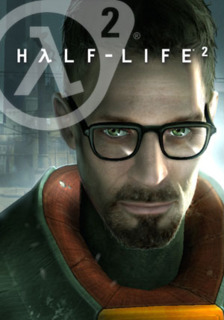The technological culmination of an era.
The game begins with a "rise and shine" note from the ever-creepy G-Man, before lunging you headfirst into the run-down setting that becomes your primary playing field: City 17. From there, you are chased by Combine, discovered by the rebels, and sent to all corners of the Earth before finally stopping at the Citadel like you were suppose to in the first place. The story certainly isn't much: a lot of your time spent on the game is getting from Point A to Point B without much in the way of plot development. The original game did not have much in way of plot either, but still, it is disappointing considering that other games in the genre have great stories.
The narrative, however, is amazing. Everything in the game is told through the eyes of Gordon Freeman. Once again, you are Gordon Freeman, and events happen around you. It is largely unchanged in execution from the original, but immersion is increased tenfold due the technology bestowed upon Half Life 2.
The Source engine is arguably one of the greatest video game engines of all time, let alone of its generation. Even today, it still looks commendable amongst a plethora of titles slapped with "HD" and "Next-Gen" tags onto them. It seems only Valve has cared for facial animation as much as developers should, because for the last four years, very few developers, if at all, have at the very least equalled the facial animation (Mass Effect and Heavenly Sword come to mind). Another standout feature is the physics engine. Half Life 2 single handedly revolutionized physics in video games, making life-like physics obligatory in all applicable games.
Audio, though not as leap-bounding as the visuals, plays an integral part in the immersion Half Life 2 offers. Crisp, clear full surround is offered in all sorts of new and old sound bytes alike.
Unfortunately, Valve has forgotten the very thing Half-Life 2 stands on, and that is game play. A new addition to the game's arsenal are vehicles. Though the only two vehicles are a boat and buggy, they provide an alternative pace to the traditional element. Again, puzzles play an important part in the Half-Life experience, and most of them this time around flex the physics muscle. Some of these puzzles range from ubiquitous and clever, to downright stupid and gimmicky. What's even more disappointing, is that the gunplay is lacklustre compared to its contemporary brethren. Many of the gunplay elements are tied to scripted obstacles in Half-Life 2, so while it may be great fun the first time, multiple play throughs will yield boredom of a high degree. Unlike F.E.A.R, Max Payne, or Halo, it's just not fun shooting people for the hell of it. Perhaps it is due to the surprisingly poor A.I or gunplay mechanics which have remain relatively unchanged since the original Doom, but whatever the case, we can only hope Valve have the time and money to look into that problem.
What it comes down to is this: Half-Life 2 is a must play title if you value the history of games. It is the culmination of the technology of an era, concentrated into one hotspot from which all future titles look up to. However, peel back the super slick presentation and revolutionary graphics, and Half-Life 2 feels like an old game gone under the knife. It's not a bad thing, not at all.

